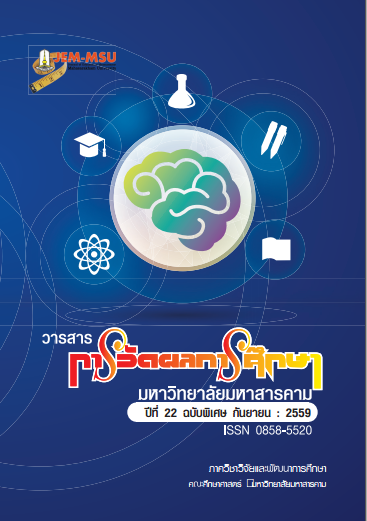A Comparison of Achievement Tests in Social Learning with Different Ratios of Test Items for Matthayomsuksa 2 Students
Main Article Content
Abstract
Achievement tests which will have quality must consist of several factors, and very
importantly, the qualities of validity, objectivity, discrimination, and difficulty. If the constructed
tests have qualities based on the academic principle, the measurement will be more efficient
and more useful to organization of learning and teaching. This study aimed to construct
achievement tests based on the multiple-choice test model with different ratios of test
items in the social learning strand for Mathayomsuksa 2 students and to compare the qualities
of the tests with different models of choice test items based on the ratios of the test item
numbers, which were 5- choice tests with the ratios of single-question type of constant
choices, and different situations with totally 4 tests. The sample used in this study consisted
of 800 Mathayomsuksa 2 students under the Office of Secondary educational Service Area
27 from 10 schools in the second semester of the academic year 2012, obtained using the
multi-stage random sampling technique. The instruments used were 5 four-choice tests, 40
items each, with choices : situations of 80 : 10 : 10, 60 : 20 : 20, 40 : 30 : 30, and 40 : 20 : 40
respectively.
The results of the study were as follows :
1. For a Construction of the achievement tests in Social Learning with Different
Ratios of Test Items for Matthayomsuksa 2 Students. For content validites of the tests form considerations of content expert, it was found that all of 4 tests had qualities which could
validly measure the contents.
1.1 For mean Test 1 had value 18.99, mean difficulties 0.47, mean discriminating
0.29, mean reliabilities 0.86
1.2 For mean Test 2 had value 18.90, mean difficulties 0.46 For mean
discriminating 0.30, mean reliabilities 0.89
1.3 For mean Test 3 had value 18.57, mean difficulties 0.460 For mean
discriminating 0.29, mean reliabilities 0.88
1.4 For mean Test 4 had value 18.30, mean difficulties 0.460 For mean
discriminating 0.27, mean reliabilities 0.86
2. The qualities of the 4 tests revealed the following :
The qualities mean difficulties, mean discriminating, mean reliabilities of the
achievement tests in the Social Learning with Different Ratios of Test Items for Matthayomsuksa
2 Students, no differences were found.
In conclusion, Test 2, namely, the 5-choice test with the single-question model
:constant-choice model : situation model with the ratios of test items at 60 percent : 20
percent : 20 percent was the most appropriate for implementation because this test had
moderate difficulties, the highest discriminating powers, and the highest validity. However,
the other 3 tests could be alternatively implemented because their different values as
mentioned were close to one another, and close to Test 2.
Article Details
The content and information contained in the published article in the Journal of Educational Measurement Mahasarakham University represent the opinions and responsibilities of the authors directly. The editorial board of the journal is not necessarily in agreement with or responsible for any of the content.
The articles, data, content, images, etc. that have been published in the Journal of Educational Measurement Mahasarakham University are copyrighted by the journal. If any individual or organization wishes to reproduce or perform any actions involving the entirety or any part of the content, they must obtain written permission from the Journal of Educational Measurement Mahasarakham University.


